初中英语常见的形容词和副词
- 格式:ppt
- 大小:686.50 KB
- 文档页数:52
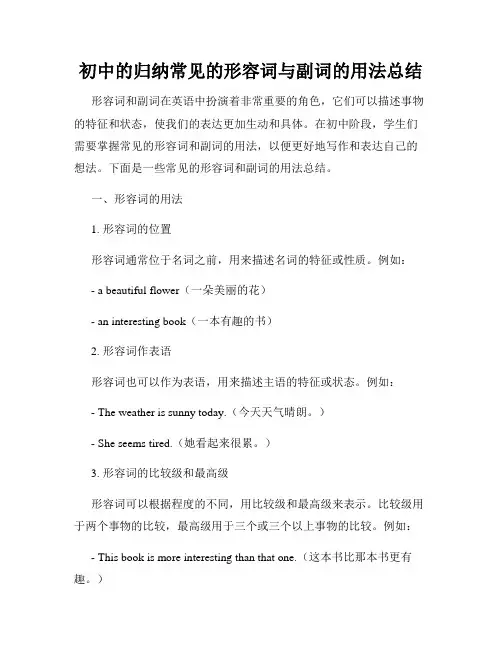
初中的归纳常见的形容词与副词的用法总结形容词和副词在英语中扮演着非常重要的角色,它们可以描述事物的特征和状态,使我们的表达更加生动和具体。
在初中阶段,学生们需要掌握常见的形容词和副词的用法,以便更好地写作和表达自己的想法。
下面是一些常见的形容词和副词的用法总结。
一、形容词的用法1. 形容词的位置形容词通常位于名词之前,用来描述名词的特征或性质。
例如:- a beautiful flower(一朵美丽的花)- an interesting book(一本有趣的书)2. 形容词作表语形容词也可以作为表语,用来描述主语的特征或状态。
例如:- The weather is sunny today.(今天天气晴朗。
)- She seems tired.(她看起来很累。
)3. 形容词的比较级和最高级形容词可以根据程度的不同,用比较级和最高级来表示。
比较级用于两个事物的比较,最高级用于三个或三个以上事物的比较。
例如:- This book is more interesting than that one.(这本书比那本书更有趣。
)- English is the most widely spoken language in the world.(英语是世界上使用最广泛的语言。
)二、副词的用法1. 副词的位置副词通常位于动词之前,用来修饰动作的方式、程度或频率。
例如:- He runs fast.(他跑得快。
)- She speaks English fluently.(她流利地讲英语。
)2. 副词作状语副词可以作为状语,用来描述动词、形容词或其他副词的方式、程度或频率。
例如:- He sings loudly.(他大声唱歌。
)- The car is too expensive.(这辆车太贵了。
)3. 副词的比较级和最高级副词的比较级和最高级的形式和用法与形容词类似。
例如:- She runs faster than her brother.(她跑得比她哥哥快。

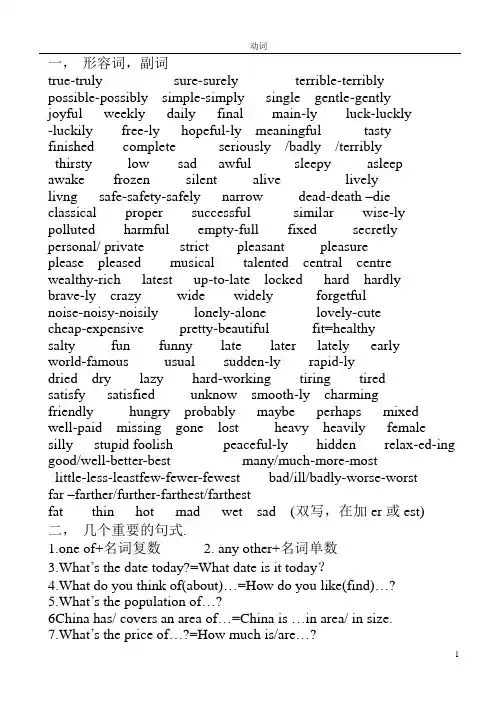
一,形容词,副词true-truly sure-surely terrible-terriblypossible-possibly simple-simply single gentle-gentlyjoyful weekly daily final main-ly luck-luckly-luckily free-ly hopeful-ly meaningful tastyfinished complete seriously /badly /terriblythirsty low sad awful sleepy asleepawake frozen silent alive livelylivng safe-safety-safely narrow dead-death –die classical proper successful similar wise-ly polluted harmful empty-full fixed secretly personal/ private strict pleasant pleasureplease pleased musical talented central centrewealthy-rich latest up-to-late locked hard hardlybrave-ly crazy wide widely forgetfulnoise-noisy-noisily lonely-alone lovely-cutecheap-expensive pretty-beautiful fit=healthysalty fun funny late later lately earlyworld-famous usual sudden-ly rapid-lydried dry lazy hard-working tiring tiredsatisfy satisfied unknow smooth-ly charmingfriendly hungry probably maybe perhaps mixedwell-paid missing gone lost heavy heavily female silly stupid foolish peaceful-ly hidden relax-ed-ing good/well-better-best many/much-more-mostlittle-less-leastfew-fewer-fewest bad/ill/badly-worse-worstfar –farther/further-farthest/farthestfat thin hot mad wet sad (双写,在加er或est) 二,几个重要的句式.1.one of+名词复数2. any other+名词单数3.What’s the date today?=What date is it today?4.What do you think of(about)…=How do you like(find)…?5.What’s the population of…?6China has/ covers an area of…=China is …in area/ in size.7.What’s the price of…?=How much is/are…?=How much do/does …cost?8.What’s the weather like today?=How is the weather?9.What day is it today?10.How are you?=How are you doing?11. can’t be too+adj.12.What’s the weight of..?=How much do/does …weigh?13.What do you think makes him so clever?14. so/such… that15.How much do you know about …?=How well do you know…?16.Which is the way to…? Can you tell me which is the way to the zoo?17.I wonder what is wrong with her.18. the key to the door the answers to the questions19.appear take place happen 不可用被动语态,主动语态表被动意义。


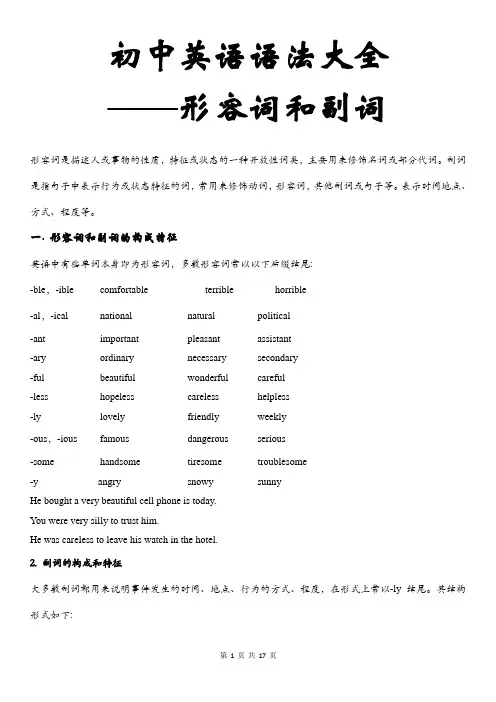
初中英语语法大全——形容词和副词形容词是描述人或事物的性质,特征或状态的一种开放性词类,主要用来修饰名词或部分代词。
副词是指句子中表示行为或状态特征的词,常用来修饰动词,形容词,其他副词或句子等。
表示时间地点、方式、程度等。
一. 形容词和副词的构成特征英语中有些单词本身即为形容词,多数形容词常以以下后缀结尾:-ble,-ible comfortable terrible horrible-al,-ical national natural political-ant important pleasant assistant-ary ordinary necessary secondary-ful beautiful wonderful careful-less hopeless careless helpless-ly lovely friendly weekly-ous,-ious famous dangerous serious-some handsome tiresome troublesome-y angry snowy sunnyHe bought a very beautiful cell phone is today.You were very silly to trust him.He was careless to leave his watch in the hotel.2. 副词的构成和特征大多数副词都用来说明事件发生的时间、地点、行为的方式、程度,在形式上常以-ly结尾。
其结构形式如下:The detective carefully observed everything in the room.He will completely finish his work by the end of this month.Such things will easily happen.二. 形容词和副词的种类1. 形容词的种类(1) 根据其结构形式分类,形容词可以分为简单形容词和合成形容词两类。

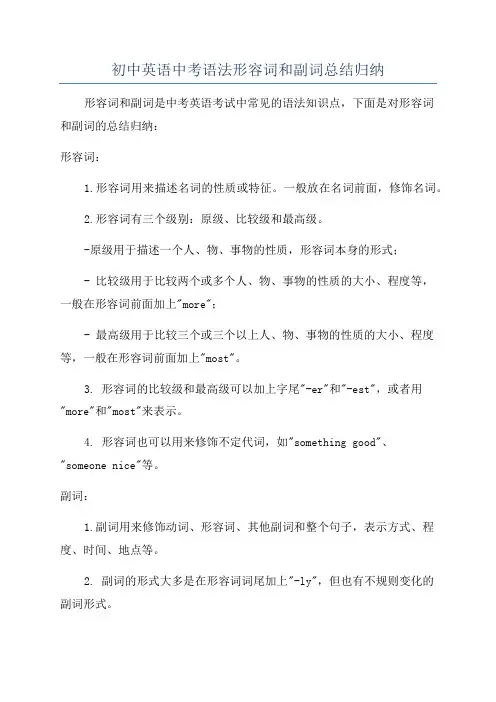
初中英语中考语法形容词和副词总结归纳形容词和副词是中考英语考试中常见的语法知识点,下面是对形容词和副词的总结归纳:形容词:1.形容词用来描述名词的性质或特征。
一般放在名词前面,修饰名词。
2.形容词有三个级别:原级、比较级和最高级。
-原级用于描述一个人、物、事物的性质,形容词本身的形式;- 比较级用于比较两个或多个人、物、事物的性质的大小、程度等,一般在形容词前面加上"more";- 最高级用于比较三个或三个以上人、物、事物的性质的大小、程度等,一般在形容词前面加上"most"。
3. 形容词的比较级和最高级可以加上字尾"-er"和"-est",或者用"more"和"most"来表示。
4. 形容词也可以用来修饰不定代词,如"something good"、"someone nice"等。
副词:1.副词用来修饰动词、形容词、其他副词和整个句子,表示方式、程度、时间、地点等。
2. 副词的形式大多是在形容词词尾加上"-ly",但也有不规则变化的副词形式。
3. 副词有原级和比较级,形式和形容词的比较级一样,可以在副词前面加上"more"来表示。
注意事项:1.形容词和副词的比较级和最高级要根据词的性质和词尾变化,不是所有形容词和副词都可以直接加上字尾来表示比较级和最高级。
2.形容词和副词的用法、位置和修饰的词性有一定的规律,需要具体问题具体分析。
以上是对初中英语中考语法中形容词和副词的总结归纳,希望能够帮助到你。
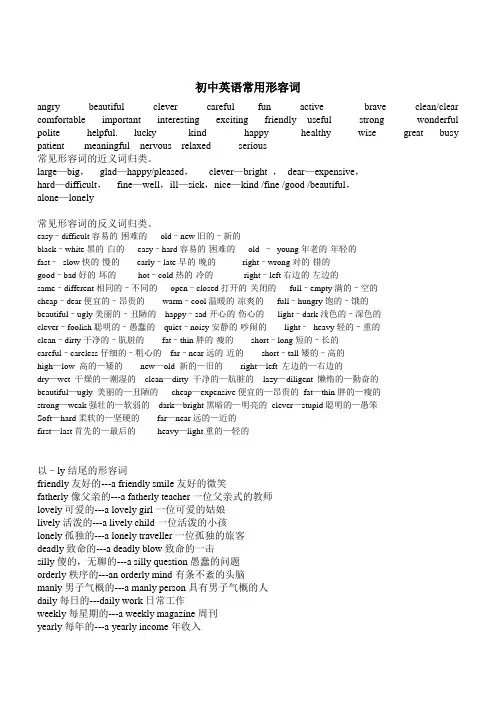
初中英语常用形容词angry beautiful clever careful fun active brave clean/clear comfortable important interesting exciting friendly useful strong wonderful polite helpful. lucky kind happy healthy wise great busy patient meaningful nervous relaxed serious常见形容词的近义词归类。
large—big,glad—happy/pleased,clever—bright ,dear—expensive,hard—difficult,fine—well,ill—sick,nice—kind /fine /good /beautiful,alone—lonely常见形容词的反义词归类。
easy–difficult容易的-困难的old–new旧的–新的black–white黑的-白的easy–hard容易的-困难的old –young年老的-年轻的fast–slow快的-慢的early–late早的-晚的right–wrong对的-错的good–bad好的-坏的hot–cold热的-冷的right–left右边的-左边的same–different相同的–不同的open–closed打开的-关闭的full–empty满的–空的cheap–dear便宜的–昂贵的warm–cool温暖的-凉爽的full–hungry饱的–饿的beautiful–ugly美丽的–丑陋的happy–sad开心的-伤心的light–dark浅色的–深色的clever–foolish聪明的–愚蠢的quiet–noisy安静的-吵闹的light–heavy轻的–重的clean–dirty干净的–肮脏的fat–thin胖的-瘦的short–long短的–长的careful–careless仔细的–粗心的far–near远的-近的short–tall矮的–高的high—low 高的—矮的new—old 新的—旧的right—left 左边的—右边的dry—wet 干燥的—潮湿的clean—dirty 干净的—肮脏的lazy—diligent 懒惰的—勤奋的beautiful—ugly 美丽的—丑陋的cheap—expensive便宜的—昂贵的fat—thin胖的—瘦的strong—weak强壮的—软弱的dark—bright黑暗的—明亮的clever—stupid聪明的—愚笨Soft—hard柔软的—坚硬的far—near远的—近的first—last首先的—最后的heavy—light重的—轻的以–ly结尾的形容词friendly友好的---a friendly smile友好的微笑fatherly像父亲的---a fatherly teacher一位父亲式的教师lovely可爱的---a lovely girl一位可爱的姑娘lively活泼的---a lively child一位活泼的小孩lonely孤独的---a lonely traveller一位孤独的旅客deadly致命的---a deadly blow致命的一击silly傻的,无聊的---a silly question愚蠢的问题orderly秩序的---an orderly mind有条不紊的头脑manly男子气概的---a manly person具有男子气概的人daily每日的---daily work日常工作weekly每星期的---a weekly magazine周刊yearly每年的---a yearly income年收入副词的分类副词按词汇意义可分为:方式副词:well,fast,slowly,carefully,quickly程度副词:very,much,enough,almost,rather,quite地点副词:here,there,out,somewhere,abroad,home哪些单词既是形容词又是副词初中常见的有:fast, hard, enough, early, late,t,high,far方式副词:well(好地) fast(快地) carefully(小心地) quickly(快地)sadly(伤心地)badly(严重地,非常)slowly(慢慢地)politely(有礼貌地)proudly(骄傲地),carelessly(粗心地)properly(适当地,完全地)successfully(成功地)happily(高兴地)angrily(生气地,愤怒地)。
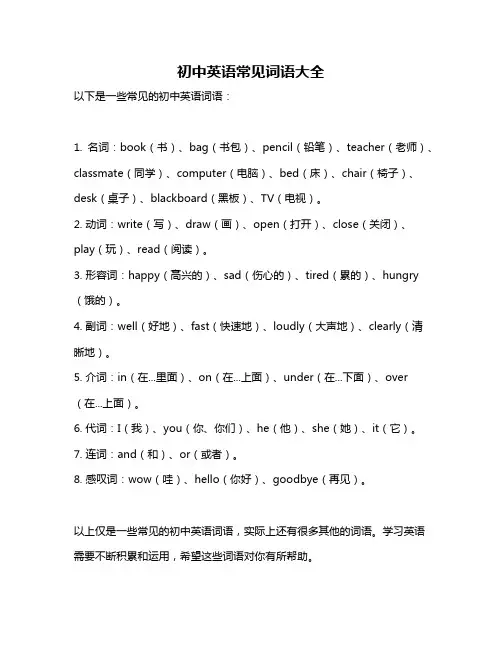
初中英语常见词语大全
以下是一些常见的初中英语词语:
1. 名词:book(书)、bag(书包)、pencil(铅笔)、teacher(老师)、classmate(同学)、computer(电脑)、bed(床)、chair(椅子)、desk(桌子)、blackboard(黑板)、TV(电视)。
2. 动词:write(写)、draw(画)、open(打开)、close(关闭)、play(玩)、read(阅读)。
3. 形容词:happy(高兴的)、sad(伤心的)、tired(累的)、hungry (饿的)。
4. 副词:well(好地)、fast(快速地)、loudly(大声地)、clearly(清
晰地)。
5. 介词:in(在...里面)、on(在...上面)、under(在...下面)、over (在...上面)。
6. 代词:I(我)、you(你、你们)、he(他)、she(她)、it(它)。
7. 连词:and(和)、or(或者)。
8. 感叹词:wow(哇)、hello(你好)、goodbye(再见)。
以上仅是一些常见的初中英语词语,实际上还有很多其他的词语。
学习英语需要不断积累和运用,希望这些词语对你有所帮助。
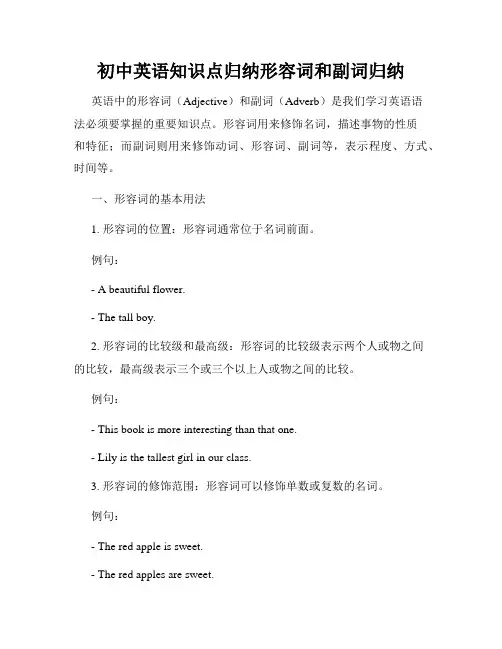
初中英语知识点归纳形容词和副词归纳英语中的形容词(Adjective)和副词(Adverb)是我们学习英语语法必须要掌握的重要知识点。
形容词用来修饰名词,描述事物的性质和特征;而副词则用来修饰动词、形容词、副词等,表示程度、方式、时间等。
一、形容词的基本用法1. 形容词的位置:形容词通常位于名词前面。
例句:- A beautiful flower.- The tall boy.2. 形容词的比较级和最高级:形容词的比较级表示两个人或物之间的比较,最高级表示三个或三个以上人或物之间的比较。
例句:- This book is more interesting than that one.- Lily is the tallest girl in our class.3. 形容词的修饰范围:形容词可以修饰单数或复数的名词。
例句:- The red apple is sweet.- The red apples are sweet.4. 形容词的性、数和格的变化:形容词的形式根据名词的性、数和格的变化而变化。
例句:- He is a happy boy.- She is a happy girl.二、常见形容词分类1. 大小、长短、高低等形容词:- big(大)- small(小)- long(长)- short(短)- tall(高)- low(低)2. 颜色形容词:- red(红色)- blue(蓝色)- green(绿色)- yellow(黄色)3. 品质形容词:- good(好的)- bad(坏的)- happy(快乐的)- sad(伤心的)三、副词的基本用法1. 副词的位置:副词通常位于动词或形容词之后。
例句:- He runs quickly.- She speaks English fluently.2. 副词修饰动词的方式:副词可以修饰动词,表示动作的方式。
例句:- She sings beautifully.- He speaks loudly.3. 副词修饰形容词或副词的程度:副词可以修饰形容词或副词,表示程度或程度的变化。
Adjectives (on1u2)1. it is (adj.) +for+ n./pron.+ to do sth.常用于客观情况的形容词easy difficult hard important unimportant possible impossible necessary unnecessary convenient inconvenient fine usual unusual essential safedangerous complicated exciting interesting2. it is (adj.) +of+ n./ pron.+ to do sth. 常用于主观感情或态度的形容词 bad good clever wise polite impolite rude silly foolish honest friendly considerate brave careful careless cruel kind right unwise intelligent stupidsensible nicemeantthoughtful wrong generous 3. adj. +enough+ to v.somebody. is adjective enough + to v.something is adjective enough for somebody to v.4. subject + can +not + enough…(to)无论怎样都不过分5. annoying/annoyed amazing/amazed amusing/amused boring/bored confusing/confused disappointing/disappointed embarrassing/embarrassed exciting/excitedinteresting/interestedmoving/movedpuzzling/puzzledsurprising/surprisedtiring/tiredrelaxing/relaxedworrying/worried6. only predicate:表语形容词afraid alive alone ashamed asleep awake aware conscious fond illunable welled as attributive: 定语形容词chief elder eldest electric exactformermainmedicalmereonlyparticularsocialspokentotalwoolen8.adj.+ that-clause/ adj. + clause 可跟that从句的形容词annoyed, astonished disappointed gladhappypleasedproudsadsorrysuresurprisedI was disappointed that many students failed to hand in their homework ontime.His teacher was very proud that he got the first prize in the National Olympic Maths Contest.9.pron. + adj.somebody someone something anyone anybody anythingeverybodyeveryoneeverythingnobodynothingsomewhereanywhere10.enough + n./ n.+ enoughDo you have enough money to pay for the bill?Yes, I have money enough.We are very glad to tell you that we have enough people to support us, but unfortunately we don’t have money enough to provide for our projects.11.present (different position, different meaning)who is the present president of the U.S.A.? (present means now)The number of the guests present is over 200. (present means to be seated) 12.note the use of the ending –ed to turn nouns into adjectives to certainexpressions. (The meaning of –ed, in these cases, is similar to with or having)wheeled transporta one-eyed sailora broad-shouldered, blue-chinned truck-drivermiddle-agedwhite-hairedstrong-willedopen-mindedlong-leggedred-eyedshort-sightedheart-shaped egg-shaped fan-shapedbell-shapedpear-shaped13.well + p.p.well-dressed well-known well-chosenwell-educatedwell-paid14.accordingly: 1.for that reason; therefore; 2.as the stated circumstancessuggestI have told you the circumstances, so you must accordingly.15.16.17.18.19.20.21.22.23.24.25.26.On1u2 adjectivei. Fill in the blanks with “of” or “for”.1.It is important _____ young people to learn some modern technology to keepup with the constantly changing world.2.Do you think it’s possible _____ s student to learn three foreign languages atthe same time?3.It was cruel _____ people to kill a large number of whales for their oil and skin.4.It is sensible _____ the officer to look into the matter before hastily making aconclusion.5.It was generous _____ Rick to donate $1,000 to the Hope Project.6.It seems difficult ____ me run so long a distance in such a short time.7.Would it be necessary ____ an applicant for a well-paid job to master Englishand computer skills.8.It was brave ____ the soldier to fight with the enemy barehanded.9.If it’s not convenient ____ you to come on Friday, how about Saturday?10.It was thoughtful ____ you to move in the flower pot before the storm came. ii. Complete the sentences with the words in the blankets in their proper forms.1.He failed in the mid-term exam. The _____________ (disappoint) result wasquite beyond our expectation.2.All the students present were ______________ (amuse) by his ____________(interest) story.3.The film was so ____________ (touch) that I was _____________ (move) totears.4.The _____________ (charm) village attracts many visitors from home andabroad every year.5.He is a very ______________ (bore) man; even being with him for a momentmakes me feel _______________ (bore).6.The _______________(annoy) noise from upstairs makes me realize that Ican’t have a ______________ (relax) day today.7.She had a ______________ (worry) look on her face, because her baby had ahigh fever.8.I felt very ashamed. I had never been in more ______________ (embarrass)situation.9.It was ______________ (surprise) that one of the Chief Executive Officersattending the APEC meeting was teenager.10.She seemed _____________ (puzzle) by his ____________ (confuse) remarks. iii. Chang the sentences similar in meaning, one word for each blank.1.The voice of the speaker was not low. We could hear it clearly. Thespeaker’s voice was ___________ ____________ ___________ to hea r.2.The room is warm. You can sleep in the room comfortably. The room is_________ __________ for you to _________ __________ comfortably. 3.The concert hall is not small. It can hold an audience of 2,000. the concerthall is _________ _________ _________ ___________ 2,000 people.4.The shop is not far away. We can go there on foot. The shop is _________________ for us to _________ __________.5.The river is not dirty. People swim in the river. The river is _________________ for people to swim in.6.She was not confident. She didn’t enter for the contest. She was _________________ ________ to take part in the contest.7.They are poor. They can’t afford the house. They are _________________ __________ to ________ the house.8.The test was a bit difficult. Not all the students passed it. The test was________ _________ _________ for all the students __________ ________.9.The girl was very careful. She didn’t make any mistakes in the exercise.The girl was _________ _________ __________ _________ make any mistakes in the exercise.10.He is very clever. He is not easily taken in by such a story.He is _________ ________ _________ _________ _________ taken in by such a story.vi. Choose the best answer to complete the following sentences.1.He left the land where he was brought up with a(n) ______ heart.A. onlyB. lonelyC. singleD. breaking2.Though there was much noise in the waiting hall. It seemed that the _______child would soon fall ______.A. sleep, asleepB. sleepy, sleepC. asleep, sleepyD. sleepy, asleep3.His proposal to build another bridge over the river is quite ______, and we willhave a discussion on it.A. acceptingB. receivingC. acceptableD. received4.I bought an ________ razor as a gift for my father’s birth day.A. electricB. electricalC. electrifiedD. electricity5.Our English teacher is a ________ speaker., so sometimes it’s difficult for us tofollow him.A. fastB. quickC. rapidD. swift6.Suffering from his illness, the _____ man becomes _______ tempered.A. ill, sickB. sick, illC. ill, illD. sick, sick7.My eldest brother is a _______ engineer, who is responsible for all thedesigning work of the company.A. mainB. majorC. chiefD. principal8.The ______ boy burst out crying at the terrible sight.A. afraidB. frightfulC. frightenedD. frightening9.It is _____ that he’ll be put into prison if he fails to pay off the debts.A. certainB. sureC. of courseD. certainly10.Fruit is said to be _______ for people but not all people are fond of it.A. goodB. healthyC. satisfyingD. valuable11.Medicine usually taste ______, but they help to cure a patient of his illness.A. sweetB. betterC. bitterD. bitterly12.The students attending the evening school are _______ young people betweenthe ages of 16 and 20.A. mainB. mostC. almostD. mostly13.A piece of _______ music will make you feel relaxed and happy.A. fondB. pleasedC. merryD. glad14.Take it ________ an keep ______. Everything will be all right.A. quiet, calmB. easy, calmC. light, quietD. calm, easy He has written many _____ short stories so far, two of which are especially popular children.A. funB. amusingC. amusedD. impressing15.I couldn’t even move may feet on this _______ bus.A. crowdB. fullC. filledD. crowdedHe struck the enemy to the ground with a ______ blow on the head. Which of the following words is not proper?A. bigB. heavyC. sharpD. strong16.Several hours of swimming made her _______.A. tireB. tired outC. tire outD. tiring out17.I want to a talk to him but I don’t know whether he is ______ or _______.A. awake, asleepB. awake, sleepingC. woken, asleepD. woke, slept18.She is _________ that her plan of expanding the business goes smoothly.A. pleasingB. satisfyingC. pleasedD. disappointed On1u2 adjectives 67-73-294i.1.for2.for3.of4.of5.of6.for7.for8.of9.for 10.of ii.1.disappointing2.amused, interesting3.touching, moved4.charming5.boring, bored6.annoying, relaxing7.worried8.embarrassing9.surprising10.puzzled, confusingiii.1.loud enough for us2.warm enough, sleep inrge enough to hold4.near enough, walk there5.clean enough6.not confident enough7.not rich enough, afford8.not easy enough, to pass9.careful enough not to10.clever enough not to beiv.1. B2. D3. C4. A5. A6. B7. C8. C9. A10.A11.C12.D13.C14.B15.B16.D17.A18.B19.A20.COn2u3117-132 (adj., adve.) 0212051.only used as predicative (no comparative or superlative)叙述性形容词afraid /alike/ alive/ alone/ asleep/ awake / ashamed / ill / awareThe man is illThat little girl is afraid of dogs.The girl is afraid.The children were asleep before you came, but now they are awake.I am aware that he is responsible for that accident.Of all the guests present, I knew only three.These two boys are very much alike.These two boys are much alike.2.well/unwell/ill/faint + adj.性质性形容词We are looking for a good place to build a companyThe place is comfortable and peaceful.Some of the greenest scenery in that area are very attractive.This is a very convincing explanation.3.(adj.)elderly, friendly, deadly, lovely, lonely, likely, lively, ugly, brotherly,sisterly,(adj./adv.) daily, weekly, monthly, yearly, early(adj./adv.) eastwards, southwards, westwards, northwards, downstairs, upstairs.We were very surprised at the deadly snake lying on the ground.It is not likely that he is able to complete the work ahead of time.The negotiation was held in a friendly way.Is there anything important in today’s newspaper?The New York Times is a daily paper.The magazine is published weekly.4.quite a few/a little = many/muchnot a few/ a little =many/muchonly a few/ a little = few/littlejust a few/ a little = few/littleso few/little = few/littlevery few/little =few/littleHurry up, there is only a little time left.Would you like to have some more? Just a little, please.The news that he failed in the exa m didn’t give us a little surprise.Many students left the tutorial centers because they obtained so little knowledge.Quite a few students trust him, for he is a nice guy.5.would you be + adj. + enough to + to V.= would you be so + adj. + as to V.Would you be so kind as to do it for me?Would you kind enough to help me carry the heavy box upstairs.She is so stupid as not to understand such a simple thing.It is not hot enough to swim here.He is cleaver not to do such a silly thing.She is rather tall for her age6.Word order (oscom)O= opinion: beautiful, horrible, lovely, niceS= shape: long, big, small, wide, short, round, narrowA= age old, new, youngC= color red, black, orange, blue, green, whiteO= origin British, Canadian, German, Chinese, Australian, RussianM= material: plastic, woodThis is a dirty old brown shirt.That is an expensive Japanese sports carHe attended a famous German medical school when he was eighteen.We are going to build a tall medical school when he was eighteen.We are going to build a tall gray building.Those three beautiful large square old brown Japanese wood tables are excellent.Taken from page 13 of PEUWhen several adjectives before a noun (or when nouns are used to modify another noun), they usually have to be put in a particular order. For instance, we say a fat old lady, not an old fat lady; a small shiny black leather handbag, not a leather black shiny small handbag. Unfortunately, the rules for adjective order are very complicated, and different grammars disagree about the details. Here are some of the most important rules.a.colour, origin, material and purposeadjectives (or modifying nouns) of colour, origin, material and purpose usually go in that order.Colour origin material purpose nounRed Spanish leather riding bootsBrown German beer mugb.other adjectivesother adjectives usually go before words of colour, origin, material and purpose. It is impossible to give exact rules, but adjectives of size, length and height often come first.The round glass table (NOT the glass round table)A big, modern brick house (NOT a modern, big brick house)Long, flexible steel polesA tall, ancient oak-treec.Judgements and attitudesAdjectives which express judgements or attitudes usually come before all others. Examples are lovely, definite, pure, absolute, extreme, perfect, wonderful, silly.A lovely, long, cool drinkWho’s that silly fat man over there?d.NumbersNumbers are usually go before adjectives.Six large eggsThe second big shockFirst, next and last most often go before one, two, three etc.The first three days (more common than the three first days)My last two jobsmasBefore nouns, we generally use commas between adjectives (especially in longer sequences) which give similar kinds of information, for example in physical descriptions.A lovely, long, cool, refreshing drinkAn expensive, ill-planned, wasteful projectBut commas can be dropped before short common adjectivesA tall(,) handsome cowboy7.感觉情绪的形容词glad, sorry, pleased; for example: more/most glad. 描绘一种绝对状态的绝对形容词(without the forms of comparative or superlative): correct, wrong, right, ready, full, empty, perfect, true, round, excellentShe is very glad to meet her mother.I was very pleased when I won the game.He gave a correct answer and I had nothing to say.She is an honest girl. What she said was absolutely true.Of all the three boys, Tom is excellent in everything.8.大部分现在分词和过去分词都可以用作形容词The football game was very exciting and the fans got excited immediately after it began.We are very pleased with the progress that the students have made so far this year.The news that the World Trade Centre was ruined was so surprising.The story is so interesting that everyone likes to read it.The worried look on her face really puzzled her teacher.9.be 动词,还有remain, prove, stay, keep, lie, stand;表示变为,成为become, get, turn, go, run, come, grow不及物感官动词:look, appear, seem, sound, smell, taste, feelHis idea proved practical.That old man remained active after fifty years of work.His dream has come true.Eggs go bad easily on the hot summer days.Charlie has gone mad.Prices are running higher and higher.The apple tastes nice.The music sounds pleasant.That man liked angry.10.He cannot run so/as fast as you.This is as good an example as the other is.I can carry as much paper as you can.He can write as many compositions as she can.It is too heavy a box to lift.He came much too early.It is much too cold.11.too…to…(with affirmative meaning); anxious, delighted, eager, easy, glad,kind, pleased, ready, surprised, willing, usually with the following words: only, all, never, just; one is never too old to learn.He is only too glad to meet you.A boy was too surprised to see how angry his father was.English beginners are too easy to make such mistakes.He is only too willing to help you.a. A is three (four, etc.) times the size (length, height, width, age, depth, etc.) of B.b. A is three (four, etc.) times as big (long, high, wide, old, deep, etc.) as B.c. A is three (four, etc.) times bigger (longer, higher, wider, older, deeper, etc.)than B.This bridge is three times as long as that one = This bridge is three times the length of that one.Your room is twice as large as mine. = Your room is twice the sized of mine.Your room is the same size as mine.The building being located near the river is four times the height of that old one.As compared with the previous years, the production in this company has doubled.This river is three times deeper than the one twenty miles away from here.After the new technique was introduced, the factory produced more than twice as many tractors in 1988 as the year before.12.This handbag is as good as, or better than the one I lost the day beforeyesterday.This handbag is as good as, if not better than the one I lost the day before yesterday..This handbag is one of the best handbags, if not the best one I lost the day before yesterday.13.the more+ adverbial clause (Vs)…, the more+ main clause (will V.)…more and more = all the moreThe harder you study, the more knowledge you will obtain.The situation in the Middle East is getting more and more complicated.Spoken English has become all the more important since China entered WTO.14.It is easier to make a plan than to carry it out.The book here is much better than the one over there.Which is large, Canada or China?Which is the larger country, Canada or China?She is taller than her two sisters. She is the taller of the two sisters.Tom is the taller of these two boys.Which is the larger school, this one or that one?The lights in your room are as bright as those in mine.He is more clever than his brother.He is cleverer than his brother.China is larger than any other country in Asia.The population of Shanghai is larger than that of Beijing.It is easy to read than to write.It is easy said than done.15.a bit / a little/ rather /much/ still /even / far /by far /any / many /a lot +comparative (a./ad.)Are you feeling any better?Please come a bit earlier tomorrow.The experiment was much easier than we had expected.His English is far better than mine, for he knows many more English words and expressions than I do.You made still greater progress last semester.My elder brother is two years older than I .Mary is the oldest of the three sisters.I have nothing further to say.The more you cheat others, the further/farther your friends will stay away from you.He obtained much more teaching experience when he worked as a tutor during his summer holiday.If there were no examinations, we should have a much happier time at school.16.副词最高级前不可用定冠词;a most a./ad. + N.只表示“非常”This is the biggest oil company in the U.S.Mike is the most intelligent student in his class.*Mike is a more intelligent student in his class.My father was a most extraordinary gentleman and he was always glad to help the poor.Of all the students in his class, Tom it the best one.17.very and much modify the superlative. This is the very best. This is muchthe best. 序数词只用在最高级中。
初中英语语法复习—代词、形容词、副词四.代词①人称代词: 主格: 单数I 、you 、he 、she 、it 复数 we 、you 、they宾格: 单数me 、you 、him 、her 、it 复数us 、you 、them⑵物主代词: 形容词性 my 、your 、his 、her 、its 、our 、your 、their名词性 mine 、yours 、his 、hers 、its 、ours 、yours 、theirs③反身代词: myself 、yourself 、himself 、herself 、itself 、ourselves 、yourselves 、themselves1.形容词性物主代词在句中只能作定语,相当于一个形容词,名词性物主代词在句中可作表语、主语和宾语,相当于一个名词。
2.注意名词性物主代词在句中所指代的关系,是单数还是复数。
如:⑴These books aren't ours. Ours are new. (这里ours=our books)⑵This is not our room. Ours is over there. (这里ours=our room)3."of+名词性物主代词"表示所属如:a sister of his 他的一个妹妹 a friend of mine我的一个朋友4.人称代词在并列使用时的顺序为:“第二人称,第三人称,第一人称”。
如:You, she and I all enjoy the music.5.关于反身代词,同学们须掌握其固定结构:enjoy oneself=have a good time (过得很愉快) by oneself=alone (单独、独自) help oneself to… (随便吃/喝些...) learn sth. by oneself =teach oneself sth. (自学)练习题1.-Whose trousers are these? -_____, I think.A.TheyB.TheirC.TheirsD.Them2. Nobody taught___English. He taught____. A.him, himself B.his, himselfC.him, by himselfD.his, his(二)修饰可数名词 many few 表否定意义 a few 表肯定意义修饰不数名词 much little 表否定意义 a little 表肯定意义 few 和 little 与quite 或 only 连用时,常加不定冠词 a.如:There are quite a few new books in thelibrary.=用little, a little, few, a few填空:1.I often stay at home because I have _______ friends here.2.Jim,don't go and get some water. There is ______ water in the glass.3.Though he learned French only ________ weeks. He can speak very well.4.Lily had _________ bread because she was hungry yesterday.(三)不定代词: something, anything, nothing.当形容词修饰这三个不定代词时,常后置。